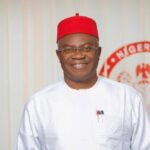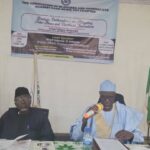By Vincent Chidindu Asogwa
For more than two decades, Nigeria’s higher education system has been trapped in a recurring cycle of strikes, suspensions, and broken negotiations between the Academic Staff Union of Universities (ASUU) and the Federal Government. Since the return to democracy in 1999, the story of public universities has been one of interrupted semesters, shattered dreams, and wasted potential. The nation’s most vital intellectual institution has spent nearly a quarter of its democratic life closed, with students repeatedly sent home as both sides replay the same old script.Reports from The Guardian Nigeria, Premium Times, and BBC Africa show that between 1999 and 2023, Nigerian universities experienced at least 19 nationwide ASUU strikes, leading to the loss of over 1,400 academic days—almost four full academic years.
The longest of these shutdowns, in 2022, lasted eight months, leaving students in over 40 universities idle while negotiations dragged on. In total, more than 50 to 63 months of teaching and research have been lost, time that no number of catch-up lectures can recover. This pattern has weakened the morale of lecturers, disrupted millions of students, and darkened the prospects of national development.The reasons for this prolonged conflict have remained largely unchanged.
ASUU has consistently demanded better pay, revitalising funding for universities, academic freedom, and true institutional autonomy. The Federal Government, on the other hand, has repeatedly signed agreements it later ignores. The result is predictable: ASUU strikes, the government pretends to negotiate, partial promises are made, and universities reopen until the next breakdown.
This cycle has hardened into a ritual of mistrust with serious consequences for Nigeria’s future.Once, strikes were ASUU’s most powerful bargaining tool. Today, they have lost their strength. What was once an act of resistance has become a blunt weapon that hurts both teachers and students without securing lasting reform. The government, aware that lecturers cannot survive long without salaries, now employs a calculated “wait-it-out” strategy.
By enforcing the harsh “no work, no pay” rule, as seen in 2022, it turns economic hardship into a weapon against its own educators. Demoralised and financially strained, many lecturers resume work without achieving their aims. This exposes the government’s cynical view that intellectual labour can be undervalued indefinitely.The cost of this crisis is both economic and human.
Analysts estimate that repeated ASUU strikes have cost Nigeria more than ₦1.2 trillion in lost academic time, disrupted research, and reduced productivity. Beyond this, morale among academics has fallen sharply. A full professor currently earns between ₦525,000 and ₦633,000 monthly, while a graduate assistant receives about ₦125,000. After deductions, some senior lecturers take home less than ₦250,000—a sum that barely covers basic living costs. Meanwhile, many political office holders earn more than ₦10 million a month in salaries and allowances.
This wide gap shows how poorly the country values intellectual contribution compared to political power.Many believe this neglect is not accidental but deliberate. It is considered a strategy to keep academics weak and dependent. By underfunding universities and dividing unions, the state maintains control over institutions meant to challenge it intellectually.
Regardless of the government in power, the approach remains the same: stall, concede a little, and move on. This deliberate devaluation of education continues to undermine Nigeria’s capacity for innovation and global competitiveness.Adding to the irony, many of the same lecturers who are denied fair pay are used as returning officers during elections.
While this seems like a civic duty, it exposes them to manipulation, public hostility, and even physical danger. Reports from recent elections indicate that some lecturers faced threats for refusing to compromise, while others were accused of misconduct. The case of Professor Nnenna Nnannaya, who staked her life to declare Mr Alex Otti the winner of the Abia State governorship election against all threats. Could that not convince us enough that many of the vice chancellors were compromised in the other states, either through intimidation, political influence or bribery? Such involvement has damaged the moral authority of academics and raised a serious question: can Nigeria’s intellectuals remain the conscience of the nation while being drawn into a system that undermines their values?If ASUU wants to escape this exhausting cycle, it must change its strategy.
The battle should move beyond pay and funding into a larger national reform movement. The union should link its cause to the struggle for fiscal justice and good governance. For example, it could lead a national campaign to rationalise the salaries of political office holders, benchmarking them against global standards. Such a campaign would expose the injustice of a system that starves education while enriching politics.
Edmund Book said, “The only way for evil to continue is for the good men to stay back and do nothing”. ASUU also needs to build stronger alliances with student unions, civil society groups, labour movements, and international academic bodies. It may even consider merging forces with other unions such as the Academic Staff Union of Polytechnics (ASUP), the Colleges of Education Academic Staff Union (COEASU), the Nigerian Union of Teachers (NUT), the Nigerian Bar Association (NBA), and the Nigerian Labour Congress (NLC).
This unity would provide ASUU with the strength to match the political class in numbers and influence. Its message should move from “Save the universities” to “Save the future.” By using media campaigns, legal action, and international advocacy, ASUU can increase its impact without depending solely on strikes.Internally, the union must also reform itself. It should address issues of transparency, accountability, and discipline among its members. If ASUU demands integrity from the government, it must uphold the same values within its ranks. It should also create mechanisms to handle misconduct and promote professional excellence.
Beyond advocacy, ASUU should invest in innovation, developing cooperative research funds, academic publishing platforms, and community-based universities that reduce dependence on government and foreign donors. Around the world, universities now generate income through innovation, consultancy, and partnerships. Nigerian universities can adopt similar models without losing their public character.At this crucial moment, ASUU stands at a crossroads. It can continue with short-term strikes that bring limited results or embrace a new, proactive strategy that seeks deep reform. Its real strength lies not in work stoppages but in its moral authority and intellectual power. By leading a national campaign for educational and social justice, ASUU can redefine itself as a force for transformation rather than reaction.
If another strike becomes unavoidable, it must be decisive, well-planned, and sustained until real change is achieved, because no meaningful transformation happens without sacrifice.Nigeria’s future depends on how it treats its thinkers.
The repeated shutdown of universities is not just a labour dispute; it is a national tragedy. Every abandoned semester, every discouraged lecturer, and every displaced student weakens the foundation of a knowledge-driven society. Both ASUU and the government must accept that this endless confrontation benefits no one. The path forward lies in honesty, respect, and real reform. The time for temporary truces is over. Nigeria must stop this cycle and fight for a lasting solution. The soul of the nation’s education system, and indeed the nation itself, depends on it.
Asogwa is a lecturer in the Department of Agricultural Education and Extension at the University of Eswatini and can be reached on (+268) 7680 2179.












